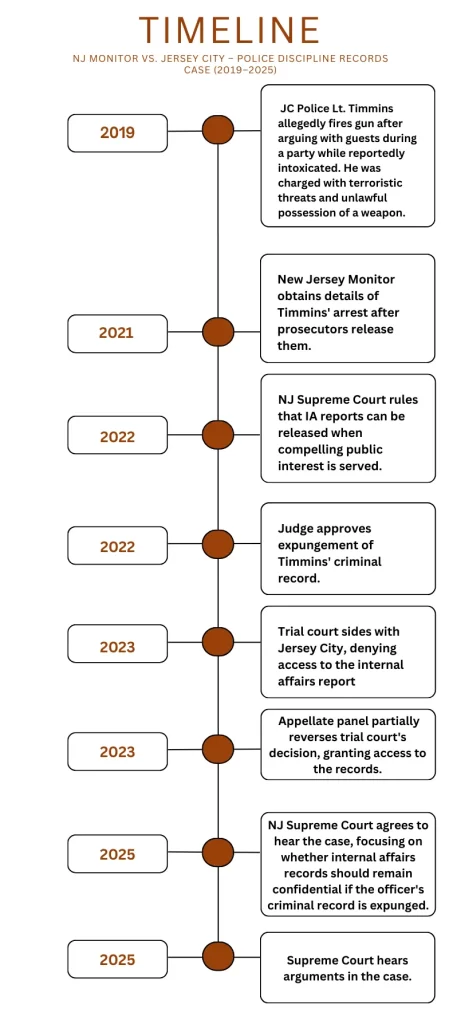States Newsroom, the New Jersey Monitor, and attorney CJ Griffin challenge Jersey City in a potentially defining court battle over police transparency.
During an August 2019 party, an off-duty Jersey City police officer—Lt. Michael Timmins—allegedly got drunk, got angry, and fired his gun after an argument with guests.
No one was hurt.
But that’s not really the story.
Despite the seriousness of the incident, Timmins was allowed to enter a diversion program—a path usually off-limits in cases involving firearms. He kept his job. His record was expunged. The whole thing was, more or less, wiped away.
His discipline? A 19-day suspension at first, then another 71 days tacked on later. No charges. No conviction. No loss of employment.
We know all of this because the New Jersey Monitor has been reporting on the case and is now in court—through its parent company, States Newsroom—fighting for access to the internal affairs report. The city has refused to release it.
Under state law, police disciplinary records are typically shielded from public disclosure. But a ruling from the New Jersey Supreme Court says that exemption isn’t absolute—it has to be weighed against the public interest. Earlier this year a Community Voices contribution affirmed this in publishing the IA report connected to a former Police Chief in Berkeley Heights, NJ. This report was obtained by a member of the public through an OPRA request to the Union County Prosecutors office and made available by OPRA Machine.
Attorney CJ Griffin, who specializes in public records law, is representing the Monitor. And if Jersey City wins this case, it could open the door for other departments to use expungement as a way to keep serious misconduct off the public record.
In an op-ed published yesterday (May 7), New Jersey Monitor Editor-in-Chief Terrence McDonald pointed out that Jersey City’s mayor, Steven Fulop—who had previously criticized OPRA rollbacks—now supports keeping these records sealed.
We reached out to McDonald for comment:
“We filed this case against Jersey City because we think it’s vital for police departments to disclose the details of disciplinary cases that are of public concern. Here, we have a lieutenant who drank as many as eight beers at his home, got in a fight with a guest, and fired his gun at private citizens. Yet we know almost nothing about how the officer managed to escape with just a 90-day suspension because the city refused to release the internal report about the matter. We think the public’s interest in the case outweighs the officer’s confidentiality concerns, and we hope the New Jersey Supreme Court agrees with us.”
Police departments in New Jersey are among the most insulated and well-funded institutions in the state. What happens in this case could determine just how far that insulation goes.
Because here’s the question: If an ordinary person fired a gun at a party while drunk, would they get a second chance—and a clean record?
And yet, in towns throughout the state, politically funded hyper-local media outlets still run front-page coverage of police-led operations against against private citizens written by police departments—no court case, no due process, just headlines.
Stories like those in Jersey City?
Well that’s why many would argue that we need outlets like the New Jersey Monitor more than ever.

Read More on State Matters
Subscribe to NJ21st For Free
Our Commitment to Ethical Journalism
|



